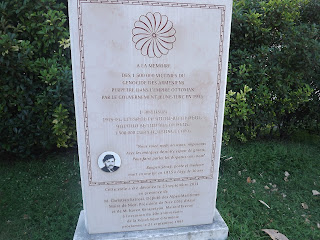HISTORICAL MEMORIAL
MONUMENT IN PUBLIC PARK IN NICE
THE
ARMENIAN GENOCIDE
The
Armenian Genocide – known as the Armenian Holocaust- was the Ottoman government’s
systematic extermination of 1.5 million Armenians. The starting date for the
genocide was April 24 1915.
On my way
to the beach of the city of Nice I had passed a modest historical memorial
monument many times during my holidays in Nice. The only reasonable explanation
for not having approached the memorial monument earlier was the hot weather. My
brain is not so active in hot weather. Sorry. Anyway I decided to take some
photos of the memorial monument to study the facts about the content of the
information written on the monument. I must admit that my knowledge about the
content of the memorial monument was not much. Making studies later on at home
in Norway I was surprised to discover the complexity of the political events described.
Let me publish the information written in French on the monument as an introduction
to the history of the Armenian people:
“ … Cette stele a ete devoilee le 23.Septembre 2011 a presence de M.
Christian Estrosi, Depute des Alpes-Maritimes, Maire de Nice, President de Nice
Cote-d’Azur et de M. Karen Karapetyan, Maire d’ Erevan a l’occasion du 20e
anniversaire de la Republique d’Armene proclamee le 21. Septembre 1991…”.
Countries who do not officially recognize the Armenian Genocide as a
genocide, are for the time being: USA, Great Britain, Israel, Ukraine, Bulgaria,
Georgia and- to my surprise: Norway! France is among the countries who accepted
that the genocide took place.
About 135 memorials commemorating the Armenian Genocide are spread
across 25 countries.
Well, let me put in this way: The cold weather of Norway made me study
the history of a modest memorial monument set up in a small and modest public
park in Nice. History alive, you may say.
Ruben Sevak whose photo is put on the memorial monument, was an Armenian poet, prose-writer, and doctor.He finished his medical education in Lausanne in Switzerland. He returned to Costantinople in 1914 with his family.
He was arrested on April 24, 1915 and killed on August 26, 1915. Ruben Sevak is known as a lyric poet.






1 comment:
Thanks for photos of monuments and sculptures in your blog and overviews, comments on these topics. It´s good to know more interesting facts about the history and the present of different countries.
Post a Comment